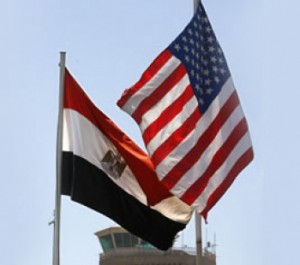U.S. condemns harassment of press but maintains its alliance
Tuesday, June 24th, 2014 10:55:42 by Shakira Subhani
With war in Iraq and Syria, Libya chaos and thinking in Washington that the Arab Spring was just a bad dream that brought disorder and instability, the United States returned to the old ways that ensured an uneasy Pax Americana in the region.
Egypt anchorage during the first decades of power in the Middle East and the Arab world, is again an indispensable ally. A circle is closed. Three years after the fall of Hosni Mubarak, another military, the new president Abdelfatá Al Sisi, is the strongest man in the USA. In Cairo, the weekend, Secretary of State John Kerry spoke of the ” historic partnership ” between the two countries, announced the release of $ 575 million in military aid and promised that “very, very soon,” the armed forces receive ten Apache helicopters.
“The idea that things are back to ‘ business as usual ‘, the usual relations between Egypt and the U.S., should not be,” said Joe Stork, head of Middle East and North Africa at Human Rights Watch. “It’s time for a change.”
“What we try to do is maintain the relationship with the Egyptian military as normal, as much as possible, while being more open and publicly critical of the Egyptian government, or things that are done in Egypt, which were with former President Mohamed Morsi,” says Michele Dunne, a specialist in Middle East think tank Carnegie Endowment for International Peace. “The problem is that this is a contradiction: one day announce that aid of 575 million blocked, and the next say resumed. ‘ Oh, my God, the humanitarian situation in Egypt is outrageous ‘ Which of the two is not? is unclear. “
The prison sentence to three journalists from Al Jazeera, two days after learning of the death sentence to 183 members of the Muslim Brotherhood, earned the disapproval of the White House. In a statement, the spokesman for President Barack Obama called on the Egyptian government to pardon or commute the sentences of journalists and grant clemency to all convicted for political reasons.
But recent court decisions have not altered the plans to resume military alliance since the late seventies underpinned the relationship between the U.S. and Egypt. The deal was round. In exchange for keeping the peace with Israel, Egypt received each year hundreds of millions of dollars invested in weapons made in USA. The money not only created employment in factories in the Midwest U.S. but this country offered a lever to influence the Middle East.
The Arab – Springs revolts against authoritarian leaders which erupted in 2011 – forced Obama to revise U.S. alliances with regimes like Egypt.
In Tunisia, the country better off out of this process, the U.S. hardly intervened. In Libya contributed to the bombing campaign that ended with the fall and death of Muammar Gaddafi. In Syria, the uprising against Bashar al-Assad led to a civil war that has killed more than 150,000 people. Iraq was a special case. It was the Obama Democratic predecessor, Republican George W. Bush, who ordered the invasion of that country in 2003, before spring, but left a lesson in Washington: regime change could not come out taxes.
During these years the U.S. president has maintained an ambiguous position, divided between the rhetoric in favor of democracy, national interests and the realization that the U.S. influence is limited to a difficult process to control.
“There has not been a consistent U.S. policy to the Arab spring,” says Dunne. “In any case, it would be a cautious response in some cases wait and see and try, with former allies like Egypt, where possible back to things as they were before 2011.”
Egypt, the most populous country in the region, was proof of the success or failure of the protests. Obama hesitated during demonstrations in Tahrir Square in Cairo, which precipitated the fall of Mubarak and coincided with a visit to the Pentagon to the Egyptian military commanders. He preserved the relationship with the rise of Mohamed Morsi, leader of the Muslim Brotherhood. He resisted designate as a ” coup ” the coup that overthrew a year ago Morsi and established a government under control of the armed forces. In October the U.S. suspended military aid in part.
“In Egypt, the United States has been too reluctant to criticize the government: first with Mubarak after the generals, after Morsi and since July, again the general,” says Stork. ” At every step the U.S. has been very reluctant to openly criticize and even more reluctant to take steps as conditional military aid.”
In the Middle East the time of democratization and idealism in American politics have been parked. The realpolitics, foreign policy based on national interests- back on the agenda.
Short URL: https://www.newspakistan.pk/?p=45655

















